Using fresh chicken manure is a great way to boost the nutrient values and more of your soil – and it’s all easier than you might think!
Chicken manure is the byproduct that chickens produce after drinking and eating their food. However, fresh chicken manure from a coop contains more than just their manure. It is actually all of the products and remnants that come from cleaning out the chicken’s bedding.
That can include feathers, leftover feed, and litter materials such as straw, pine shavings and sand. All of which, believe it or not, have nutritional value when it comes to building better soil and powering plants in your garden and flowerbeds.
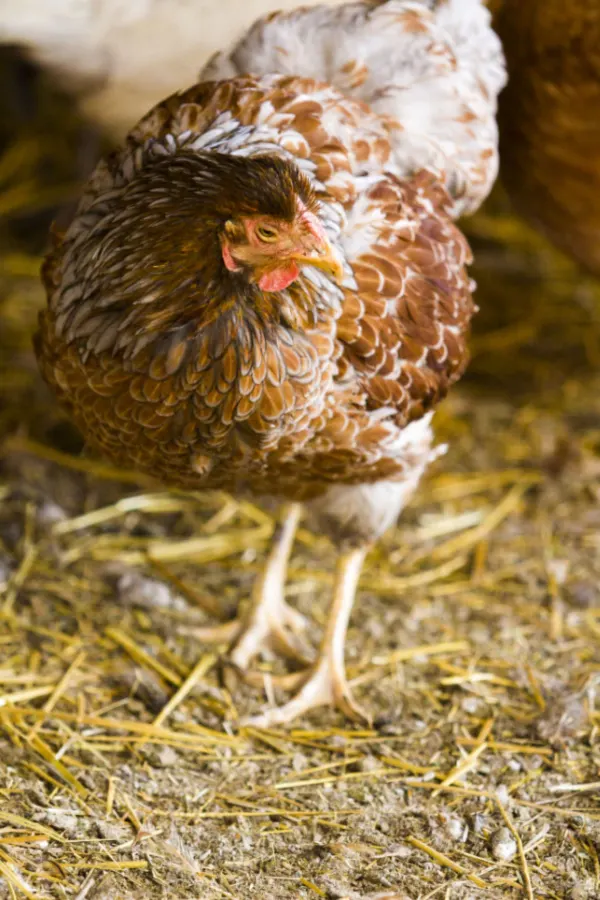
For starters, chicken manure is packed full of nitrogen (N), phosphorus (P), potassium (K). Those three minerals, of course, are the major components that power fertilizers. And chicken manure is actually one of the best animal manure available because it contains the highest levels of NPK of all animal manures.
Even more, chicken manure contains calcium, magnesium, and many other essential nutrients that plants need to grow and thrive. That’s what makes it such a great by-product, and all from cleaning a chicken coop!
Additional Benefits of Chicken Manure
Aside from the nutrients available, chicken manure also contains bacteria and enzymes. Most of these items are beneficial to your plants and the soil.
In addition, if the chickens are free-ranging birds, their manure will also be composed of organic materials such as grass, insects, seeds, etc. All of this organic matter is perfect for improving the composition of your soil.
Organic matter is critical to add to your soil, as it helps to improve its overall structure. It also helps the soil’s capacity to hold moisture, allows it to drain properly, and improves the aeration of the soil as well.
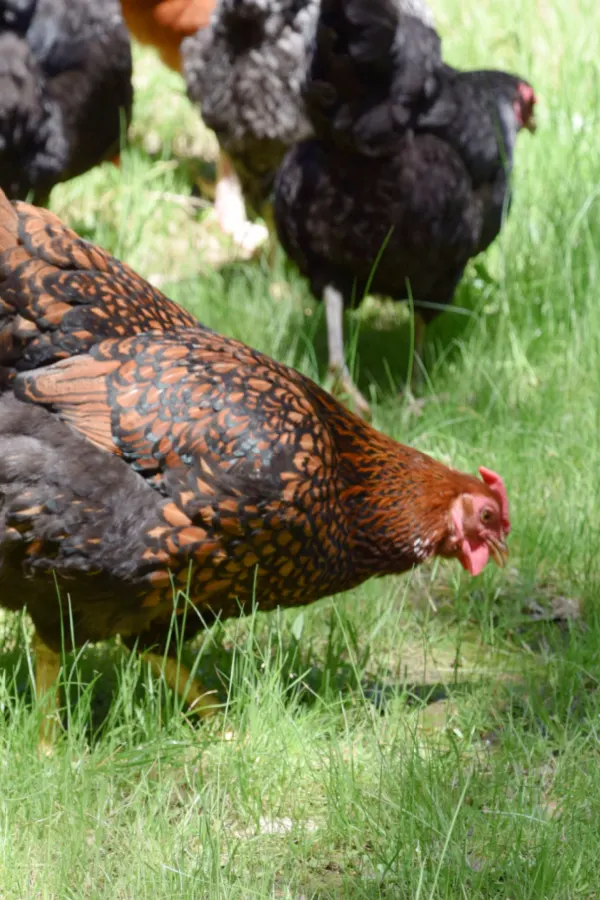
If you already raise chickens, you have one of the best soil additives around just waiting to power your plants. You can also check with neighbors that raise chickens for fresh manure. Just keep in mind that it might cost you a little bit of manual labor in return!
But even if you don’t have chickens, you can purchase bagged organic chicken manure at local garden centers that are ready to use.
This manure will is safe and ready to use straight from the bag. From container perennials to flowering annuals and more, aged chicken manure is the perfect addition! It can power your plants right from the start!
So what can you do with the fresh manure? Here is a look at three perfect methods for turning your chickens leftovers into a mountain of gold!
Three Great Ways To Use Fresh Chicken Manure To Power Plants
#1 Adding To Compost – How To Use Fresh Chicken Manure
While it might be tempting to just toss the contents of your recent coop clean out onto the soil of your plants, it can actually cause way more harm than good.
Fresh manure is considered “hot,” which means that it can easily burn delicate plants and foliage. You should never use chicken manure fresh from the coop and place it directly near plants.
In addition, the feces is also teeming with pathogens and bacteria. These items can make you or your family sick if it is mishandled and the pathogens aren’t killed off properly.
Because of this, it is best to let chicken manure age. The best way of doing this is to add chicken manure to your home compost pile.
Fresh manure is a great addition for improving the composition of compost piles. In addition, because fresh manure is “hot,” it can really help to heat up compost piles. A hot compost pile equals fast decomposition of contents and a quicker turnover rate.
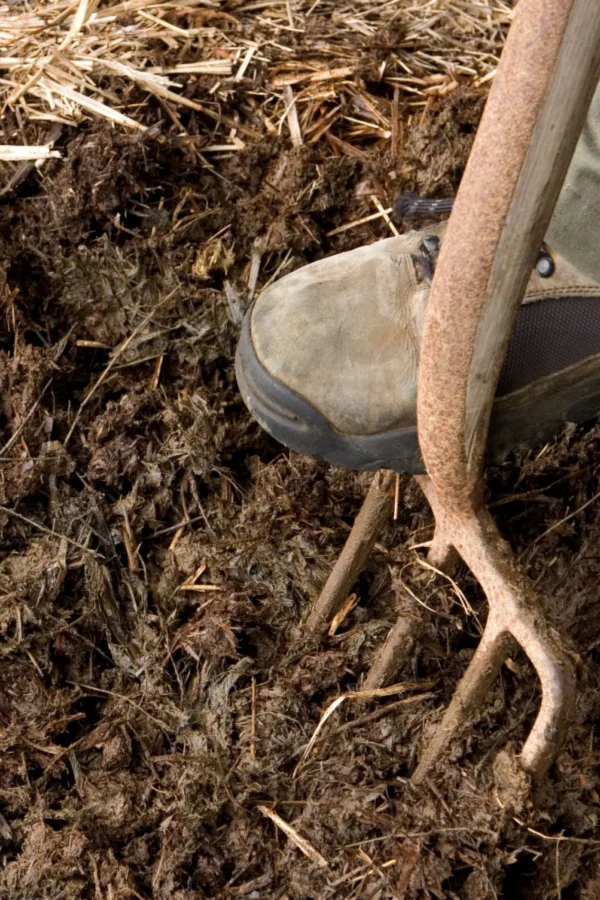
It will take a few months up to a year for your compost to break down enough for use. But once your compost is complete, it can now be used anywhere you use soil. Add it to your holes when planting transplants. Mix it in as a mid-season, all-natural fertilizer boost for growing plants. You can even use compost as a natural mulch.
Aging Chicken Manure Without A Compost Pile
If you don’t have a compost pile, you can still age chicken manure so you can use it anywhere. Simply create a pile of manure that is around 3 feet tall by 3 feet wide. Turn the pile every week or so to help speed up the “heating up” process.
The process can take anywhere from 3 months up to a year to complete. The timeline will depend on outside elements, how hot the pile gets, and how often you turn it. But once it all breaks down, it is perfect to use as an all-natural fertilizer wherever your flowers or plants need an extra boost.
#2 Making Manure Tea – How To Use Fresh Chicken Manure
While “manure” and “tea” don’t usually belong in the same sentence, this isn’t talking about a drink that humans consume!
Once you have your chicken manure composted and properly aged, you can use it to create manure tea. Manure tea is a 100% all-natural, nutrient-packed liquid fertilizer for your plants. It’s the best way of quickly delivering nutrients to plants for an added boost.
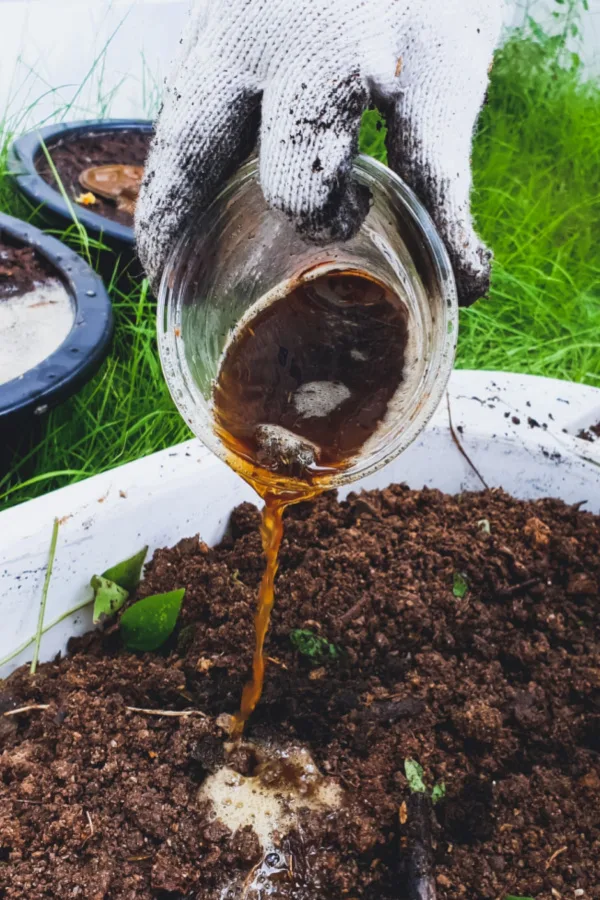
You need just five things to create manure tea: Aged chicken manure, water, a 5-gallon bucket, something to stir with, and a colander. To create, mix one-part chicken manure with three parts water in the bucket and stir well.
Let the mixture soak for a few days, mixing once or twice daily. After a few days, strain off the solids from the liquid. Add the solids back to your compost pile. Your homemade liquid fertilizer is now ready to use to power your plants!
The next time you go to water your plants or whenever your plants need an extra boost of nutrients, use manure tea instead.
Not only can you use manure tea around plants to soak into their roots, but you can also spray it directly onto the foliage as well. (Just be sure you are using aged chicken manure and not fresh manure.)
#3 Side Dressing Plants – How To Use Fresh Chicken Manure
It is possible to use slightly aged chicken manure to side dress some plants without fully composting it. Put the manure about foot or so away from the base of each plant. This allows the nutrients of the manure to soak into the soil without burning the plants or roots.
It is advised to side dress trellised or crops that won’t touch the soil (such as cucumbers or tomatoes) at least 3 months before harvesting. If you are side dressing root vegetables, leafy vegetables, or crops like bush beans or strawberries, apply the slightly aged chicken manure about four months prior to harvesting.
Keep in mind that it is still possible to burn your plants if there is too much manure. It is best to focus on side dressing plants that are acid-loving. They can handle the higher alkaline nature of the chicken manure.
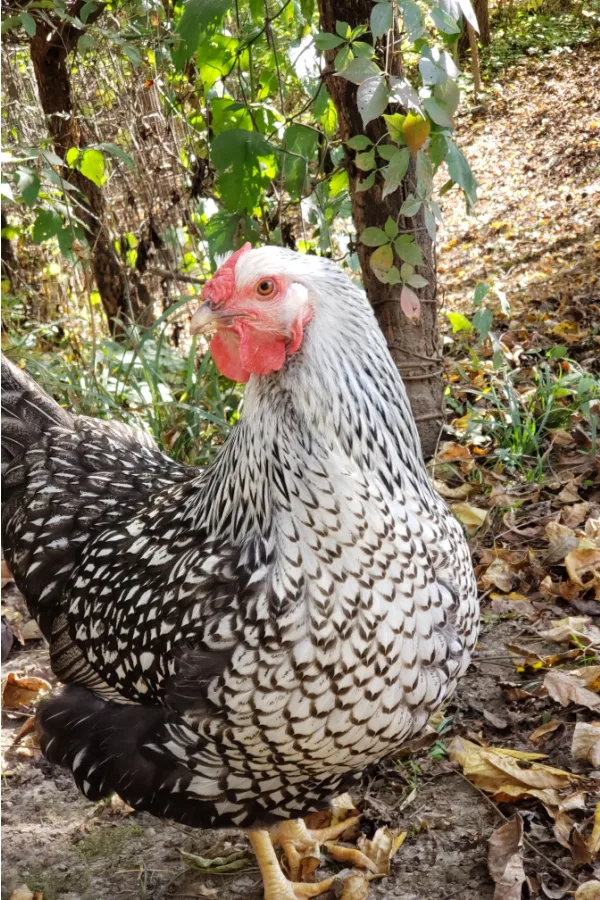
When in doubt about side dressing, compost your chicken manure prior to using. This ensures that you sufficiently kill off all of the pathogens and bacteria. While the bacteria isn’t an issue for the plants, it’s mostly a safety concern when you go to consume the fruit and vegetables.
Bonus Tip
At the end of the growing season and after you have cleared out your garden space, you can apply fresh chicken manure to the soil. This will allow the manure to age on your garden itself instead of in a pile.
It is best to apply fresh chicken manure several months prior to planting. So a location that only goes without crops for two or three months won’t be enough time for proper aging. It is best to apply the manure in fall and then plant in late spring.
Unfortunately, the odor might be an issue with this method for some. Slightly turning the soil to incorporate the manure will help with that problem. It will also help to evenly distribute the nutrients throughout the soil. This way, they are ready to go come springtime.
Hopefully, you can take advantage of the many bonuses that using fresh chicken manure creates for your flower and plants!
Follow Our Facebook Page For Even More Great Tips! Simple Garden Life Facebook Page
Simple Garden Life is a website dedicated to keeping gardening fun, simple and enjoyable! We publish two new articles each week along with a new garden podcast episode every two weeks. This article may contain affiliate links.
